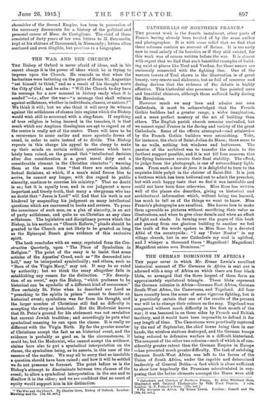THE GERMAN DOMINIONS IN AFRickt THE paper cover in which
Mr. Evans Lenin's excellent historical account of The Germane isa Africa is sent out is adorned with a map of Africa on which there are four black blots, so arranged that the three largest of them form an approximately equilateral triangle. These blots represent the German colonies in Africa—German East Africa, German South-West Africa, the Cameroons, and Togoland. All four have recently been the scene of some vigorous fighting, but it is practically certain that one of the results of the present war will be to change their colours on the map. Togoland was conquered without much difficulty in the first month of the war ; it was hemmed in on three sides by French and British territory, and it would have been impossible to defend it for any length of time. The Cameroons were practically captured by the end of September, the chief towns being then in our hands, the wireless stations destroyed, said the German troops being reduced to defensive warfare in a difficult hinterland. The conquest of the other two colonies—each of which is of con. eldership greater extent than the German Empire in Europe —has presented much greater difficulty. The task of subduing German South-West Africa was left to the forces of the Union of South Africa, under the capable and determined leadership of General Botha—a fact which is alone sufficient to show how hopelessly the Prussians miscalculated in sup. posing that the better elements amongst the Boers were still • Cathedrals and Cloisters of Northern Prance. By Elise Whitlock Howa Illustrated with Original Photograph, by Vial hunt Franciii. 2 vols. London: G. P. Pubiant's Sons. [2ls. net] t The Germans is divico. By Evans Lewin, Louise, Cassell and Co. ROL 61. net.] disaffected to the British Empire. There was, however, some local and internal trouble, so that it was not until last month that General Botha was able to announce the surrender of Windhoek. German East Africa, which is even larger, and has a native population of some eight millions, is still holding out, and has already coat us many valuable lives ; but its ultimate subjection to the Power which has command of the sea, and so is alone able to obtain supplies and reinforcements, can only be a question of time. We can now realize what a grave mistake was made by the statesmen of the later Victorian age m permitting Germany to establish herself on the flank of our South African possessions and astride of the Cape to Cairo route. It is quite conceivable that a little more firmness and foresight on our part, at the time when Bismarck originated his" world-policy," might have spared us a great deal of hard fighting to-day. It would have been easier to prevent Germany from obtaining these colonies than it has proved to turn her out of them. As Earl Grey says in his brief but extremely interesting introduction to Mr. Lewin's book, " unetatesmanlike lack of foresight, apathetic indifference to the requirements of the future, and a timid reluctance to seize the oppor- tunities brought within reach by individual effort appear to have been the distinguishing features of the Government action recorded in these pages." Earl Grey gives some striking examples of the way in which the late Cecil Rhodes interfered to prevent German diplomacy from securing strategical positions which would have made our present task of conquest even more difficult than it has been proved to be. Mr. Lewin describes the acquirement and administration of the German colonies in Africa with great clearness and the detailed knowledge which is reasonably to be expected in the Librarian of the Royal Colonial Institute, and we have no hesitation in endorsing Earl Grey's recommendation of his valuable book to the British public.















































 Previous page
Previous page